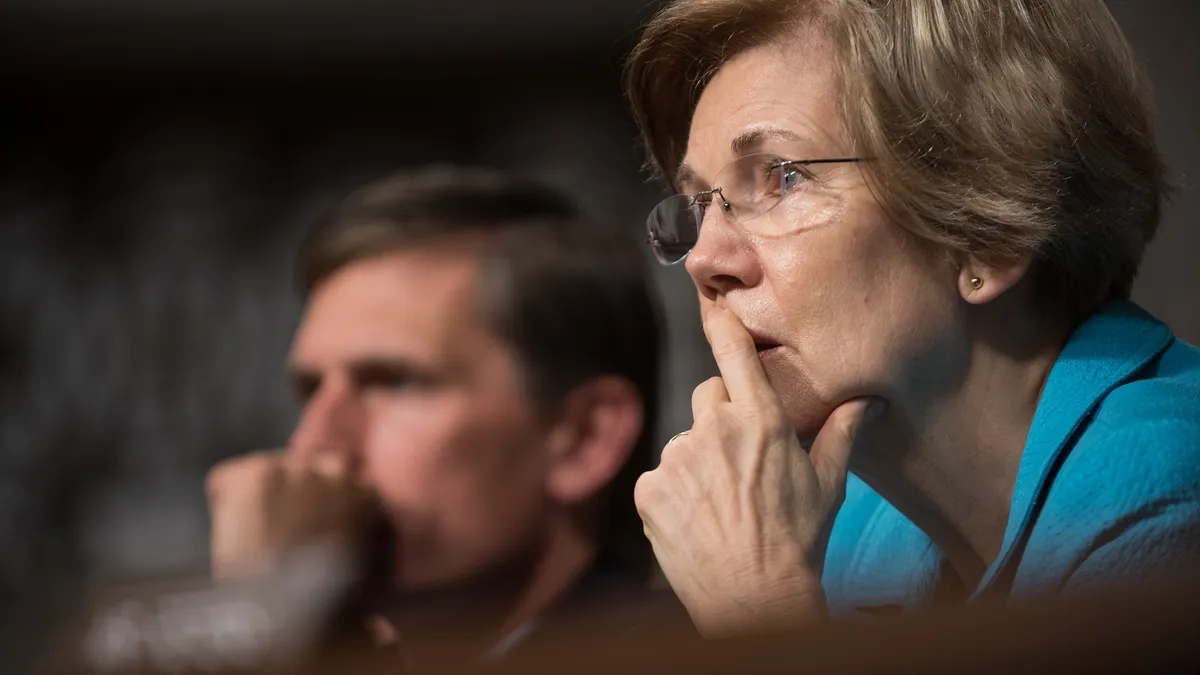Dive Brief:
- In a letter sent Tuesday to U.S. Education Department Secretary Betsy DeVos, Democratic Sen. Elizabeth Warren and two other members of Congress expressed concern and sought more details about the department's plans to test income share agreements (ISAs).
- They also sent letters to the heads of seven colleges that use ISAs, including Purdue University and the University of Utah, asking for more details about their programs, including copies of their contracts.
- The inquiry follows comments in April by a top department official suggesting the federal agency may experiment with ISAs, and it reflects concerns that ISAs are essentially student loans by a different name.
Dive Insight:
ISAs are gaining traction in nontraditional education programs such as boot camps. There, advocates say, they offer more students access to financing based on the possibility that participating in the program will significantly increase their earnings. Colleges have begun to offer ISAs, too, though they are still a small part of total institutional aid.
Educational institutions use ISAs to front the cost of students' attendance, which the students then pay back as a percentage of their income over time once their pay reaches a preset threshold. As a result, some students pay more while others pay less.
At traditional colleges, ISAs are commonly pitched as an alternative to high-interest private loans for students who may need assistance covering the remainder of their college costs. They're also seen as a way for colleges to share financial risk with students.
However, in their letter to the Ed Department, the lawmakers critique this positioning. ISAs, they write, "carry many common pitfalls of traditional private student loans — with the added danger of deceptive rhetoric and marketing that obscure their true nature." Those can include relatively low repayment thresholds and high default penalties, as well as mandatory arbitration agreements and class action bans.
Limited transparency and regulatory oversight are also concerns. What's more, the need for black students to borrow more heavily to finance their education, the lawmakers write, "suggests that ISAs will inherently have a discriminatory impact," as does the possibility contract terms may differ among students based on their likely income after graduation.
Their take reflects broader criticisms about ISAs, amplified by their concern the Ed Department will open a pathway for taxpayer funds to support them.
In a separate analysis, nonpartisan think tank New America writes that ISAs join an already complex student financing landscape and argues students may not be informed about the nuances of this form of aid. Additionally, they explain, colleges may not be motivated to stem tuition increases because they can "market 'risk-free' dollars."
Manhattan Institute Senior Fellow Beth Akers, meanwhile, told Education Dive the Ed Department shouldn't offer ISAs for now. Instead, she said, it should incorporate aspects of their design into existing lending, such as to simplify income-based repayment.
"We've got a lot of systemic challenges in higher ed that financial aid or ISAs certainly cannot fix," Akers said. "They're absolutely not a silver bullet. ... They're a substitute for something that's working really poorly."
In their letter to the Ed Department, the lawmakers urge it to focus on "trying to stem the tide of indebtedness" through addressing the backlog of borrower-defense claims and improving the Public Service Loan Forgiveness program.














